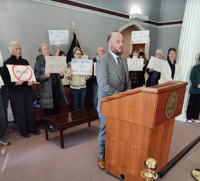THE GRASSROOTS write-in campaign supporting President Joe Biden had a big sugar daddy.
Federal Election Commission filings last week revealed that hedge fund executive and longtime Biden supporter Reid Hoffman kicked in $2 million to the Granite for America Super PAC set up by former Party Chairman Kathy Sullivan in support of this effort.


Former state Sen. Martha Fuller Clark, D-Portsmouth, kicked in $25,000.
As Forbes reported, Hoffman’s backing of Biden and opposition to former President Donald Trump has included him helping fund the defamation lawsuit writer E. Jean Carroll brought against Trump, which ended in an $83 million judgment against the former president.
Hoffman, a resident of Anacortes, Washington, also gave $250,000 last year to GOP presidential rival Nikki Haley’s Super PAC.
Several media outlets have reported Hoffman dropped his support of Haley after she lost the New Hampshire primary to Trump by double digits.
Granite for America still has nearly $1.8 million it can use between now and November to promote Biden’s reelection.
They spent $239,000 on the write-in effort.
Expenses included kicking over $20,000 to the New Hampshire Democratic Party and paying about $35,000 to three D.C. and New Hampshire consulting firms.
Hoffman himself received $100,000 for “in-kind fundraising consulting.”
Independent expenditures included almost $30,000 for digital ads through Left Hook of Santa Monica, California, and $43,000 for direct mail through Mission Control Inc. of Glastonbury, Connecticut.
An affiliate group, Granite State Write-In, reported spending $31,623 of the $56,559 it had raised.
Donors to this group included the Leadership PAC of U.S. Rep. Annie Kuster, D-N.H. ($10,000), the American Federation of Government Employees union in Washington ($5,000), Stonyfield Yogurt co-founder Gary Hirshberg ($1,000), 2022 Democratic nominee for governor Tom Sherman ($1,000), Concord lobbyist Jim Demers ($2,500) and Seacoast Democratic activist Larry Drake Jr. ($2,500).
Consultants received $17,500 in payments from this second organization, with another $8,500 going for printing services.
No-show affected Dems
Official vote totals from the first-in-the-nation presidential primary confirm what state Democratic leaders had feared.
Biden’s decision not to appear on the ballot made his state party an even smaller minority in New Hampshire.
The day before the Jan. 23 vote, Republicans had just a 5,200-person advantage over Democrats in party registration.
Once all the votes had been counted, the GOP registration majority had grown to more than 32,000.
Why?
Without a real contest, independents, by more than a 5-1 margin, voted in the GOP primary (134,362) won by Trump. That compared to 25,735 in the Democratic contest won by Biden on write-ins.
Of the independents who cast ballots, 37,313 did not change back to that status before leaving the polling place.
With most of those becoming Republicans on paper, the GOP now has an even more solid edge over Democrats, 33.3% to 29.75.
Independents remain the dominant group (37%), but their clout actually dropped by 1% compared to 2020.
Some may conclude this swing voting is standard operating behavior any time an incumbent president runs for a second term.
Not so fast.
In 2020 when Trump was seeking a second term, more independents (130,738) did vote in the very competitive Democratic primary, which Bernie Sanders narrowly won, than in the GOP race (39,662), which Trump won with nearly 90% of the vote over former Massachusetts Gov. Bill Weld.
Still, independents’ participation in the 2020 Democratic primary was considerably smaller than their involvement last month.
Coming out of 2020, Democrats were the majority party here (31.9%), but the GOP forces were noticeably closer (30%).
Democratic Party Chairman Raymond Buckley no doubt would warn GOP leaders that they only “lease” these independents, who may not remain in their ranks.
The theory is that most of these independents cast ballots for runner-up candidate Haley, meaning a majority can’t be counted on to support Trump in the general election.
More figuring
• Record set: The total number of ballots cast in the GOP race was a record 324,612, and even with just a write-in battle, an impressive 125,245 showed up to vote in the Democratic primary.
With the potential for an open race on both sides in four years, it’s possible each party could break its own new mark in 2028.
• Beat this turnout: How many states with primaries and caucuses to come will meet the 51.1% of registered voters who cast ballots here? That figure blew out the 2020 turnout of 43.5%. In fairness, that’s because every 10 years the state strikes a few hundred thousand voters from the voter checklist who haven’t voted in recent elections. In 2016, the turnout was 59.2%.
• Low absentees: Only 7% of Democrats and 5.5% of Republicans voted by absentee ballot. These numbers are below even the pre-COVID average, which typically was in the low double digits.
• Indies not a record: Despite the largest turnout for a party’s primary, the GOP didn’t attract a record number of independents.
The high mark was reached in 2020, when 43.5% of the votes in the Democratic primary were cast by independents. On Jan. 23, independents accounted for 41.5% of the total GOP turnout.
They might have set the mark had Trump been less successful in turning out his conservative base.
Four years ago, with Trump facing only token opposition, just 119,129 Republicans voted.
Twelve days ago, 189,980 Republicans cast ballots.
Some polling close to the Haley camp concluded that the seven-figure Moving the Needle Super PAC campaign on TV in the closing days might actually have hurt Haley among base voters.
The group’s message that Haley was a darling with independents might have turned off base Republicans, with tracking surveys suggesting this could have boosted Trump’s victory margin on Election Day.
House Dem ethics stance
In December, the Legislative Ethics Committee admonished State Rep. Alissandra Murray, D-Manchester, for having voted on abortion rights issues that her employer, the Reproductive Freedom Fund of New Hampshire (RFFNH), tried to influence at the State House.
She signed a settlement document in which she agreed to recuse herself from voting on such matters in the future.
On Thursday, after voting on three abortion rights bills, Murray insisted on X that she complied with the ethics opinion because the RFFNH didn’t lobby on any of them.
These measures included a proposed constitutional amendment on abortion rights (CACR 23) seeking to enshrine the state law that bans abortions after 24 weeks of pregnancy.
“As long as my employer continues to avoid lobbying activities, I will continue to vote on abortion bills and abide by House Ethics standards,” Murray wrote.
The Sunday News confirmed in 2023 that the RFFNH did seek to gain support for a similar pro-abortion rights constitutional amendment (CACR 2), which fell short of collecting the three-fifths majority needed to pass.
Murray also took to voting strategically last week.
When the House voted overwhelmingly Thursday to indefinitely postpone or bounce from any consideration in 2024 a bill (HB 1248) imposing a ban on abortion after 15 days of pregnancy, Murray was one of only 11 to oppose that move.
County attorney to judge
Last week, Sununu nominated Belknap County Attorney Andrew Livernois of New Hampton to a superior court judgeship.
If that sounds familiar, it should.
Just last month, Melissa Countway of Alton was sworn in as an associate justice of the Supreme Court.
Soon after Sununu’s first election in 2016, he made then-Belknap County Attorney Countway his first judicial pick, nominating her to a circuit court judgeship in the region.
Livernois was appointed county attorney in August 2017 and has been successful in every election since.
Last week, Sununu received the first of three more superior court judgeships he will fill during his last year in office.
Judge Brian Tucker of Hopkinton, who turns the mandatory retirement age of 70 on March 15, filed his papers.
Other judges reaching retirement age in 2024 are Amy Ignatius of Concord in April and Peter Bornstein of Berlin in August.
Prepping for total eclipse
State officials plan to devote resources, especially in the North Country, to dealing with crowds anticipated for the total solar eclipse on April 8.
“It’s a bad analogy, but we’re treating it almost like Race Week,” Sununu said, referring to the state’s annual preparation for the NASCAR race at New Hampshire Motor Speedway in Loudon.
Travel and Tourism Development Director Lori Harnois said plans include a special web page where businesses can post packages and special events, a new logo and yes, the purchase of “official” eclipse viewing glasses to be handed out to lodging partners across the state.
Last week, Sununu nominated Harnois to another four-year term as the state’s tourism chief.
Second efforts
State Rep. Lisa Smart, R-Meredith, has asked the House to reconsider its 193-179 vote to pass legislation (HB 1002) allowing the state, city or town to charge up to $25 an hour for extensive record requests under the Right-to-Know Law.
Last week, the House rebuffed a second effort by those trying to block the House-passed bill (HB 396), which would allow that only members of the same biological sex to play on sports teams or gain access to locker rooms and bathrooms.
The House passed it Jan. 4, 192-184. A bid to reconsider that action Thursday failed, 190-187.
Sununu urges action
Sununu said Biden and both houses of Congress have failed the American people by not securing the southern border.
“I would hope they do something, something absolutely has to get done,” Sununu said of reports that a bipartisan deal on the issue had been close at hand until former President Trump sought to block it. Meanwhile, some liberal Democrats oppose further crackdowns on migrants.
Sununu decided to join Texas Gov. Greg Abbott and 13 other GOP governors at Eagle Pass, Texas, on Saturday because he said Biden failed to use executive authority to reduce illegal border crossings.
“Nobody believes anything he his saying on the border right now,” Sununu said. “They aren’t even faking it well. They are lying and they are lying badly.”
Less-than-ardent support
Sununu’s political affinity for former state Senate President Chuck Morse of Salem goes back a long way; he backed Morse’s U.S. Senate bid in 2022.
But Sununu admitted consternation at Morse’s decision months ago to weigh in on Trump’s behalf, calling it an “extremely odd fit.”
Sununu said he spoke privately to many prominent Republicans who backed Trump and came away with a similar vibe from each conversation.
“None of them have shown any deference or respect towards the former president,” Sununu said. The endorsements, he believes, were born “more out of fear than anything else.”
Lauren Carney’s loss felt
Friends and political foes alike lament the passing of Lauren Carney, 66, who lost a nine-year battle with brain cancer.
The wife of GOP consultant David Carney and mother of their three kids was an immovable force while working on countless presidential, congressional and gubernatorial races across the country.
But what most set her apart was wit, grace and empathy, qualities not easily found in today’s polarized country.







